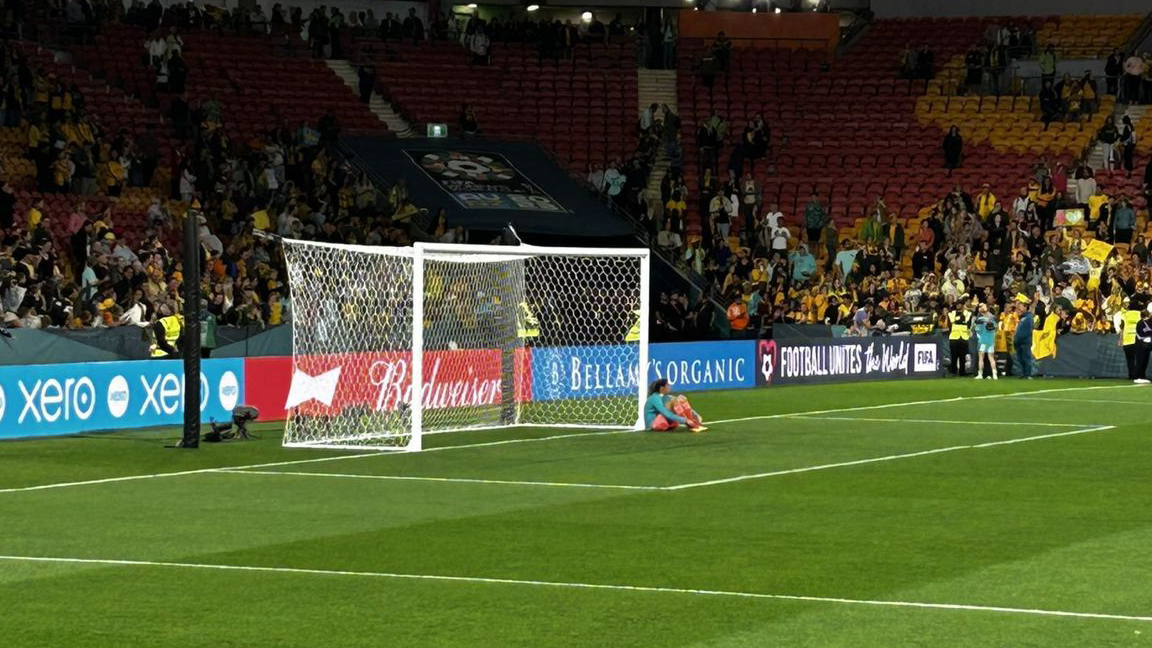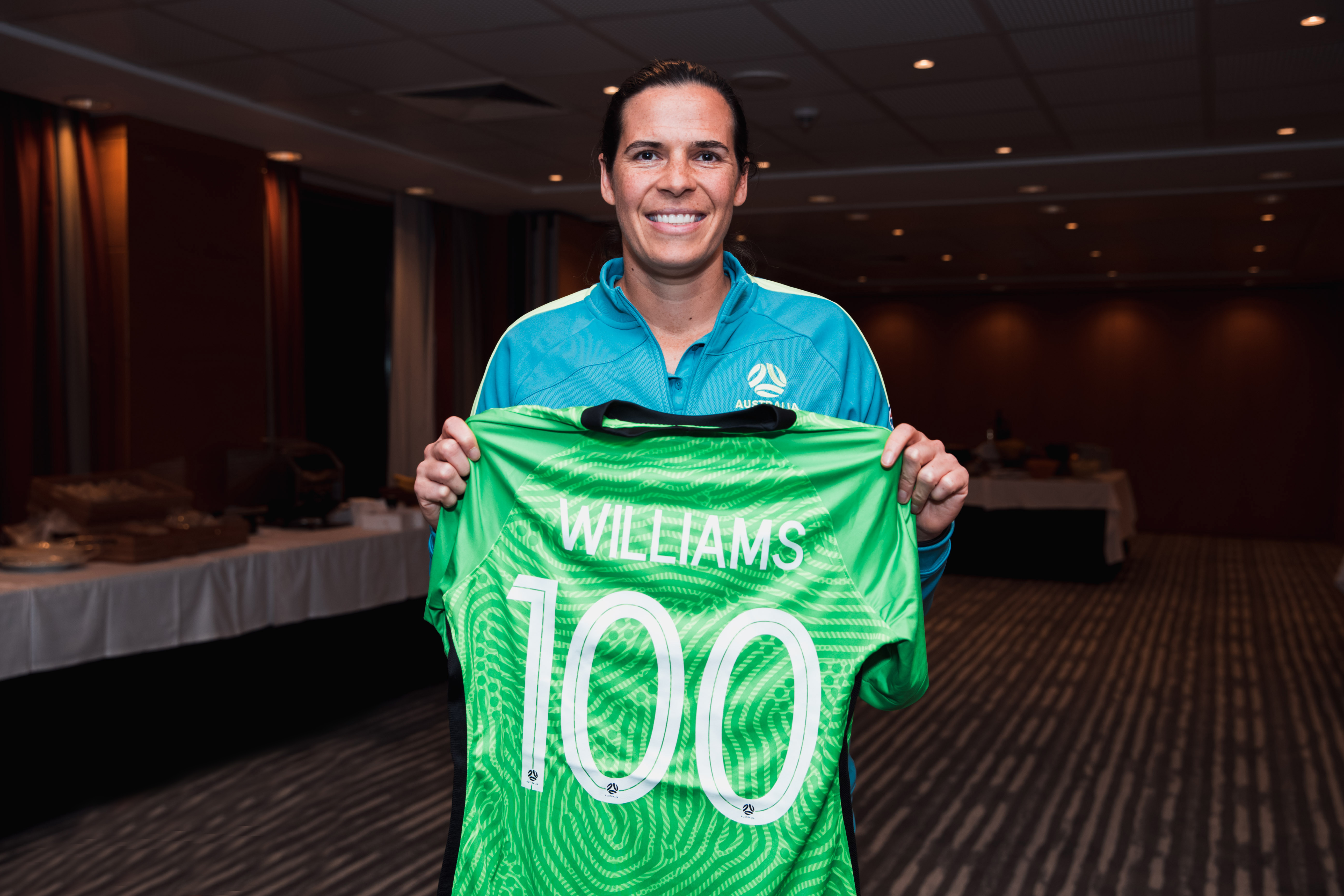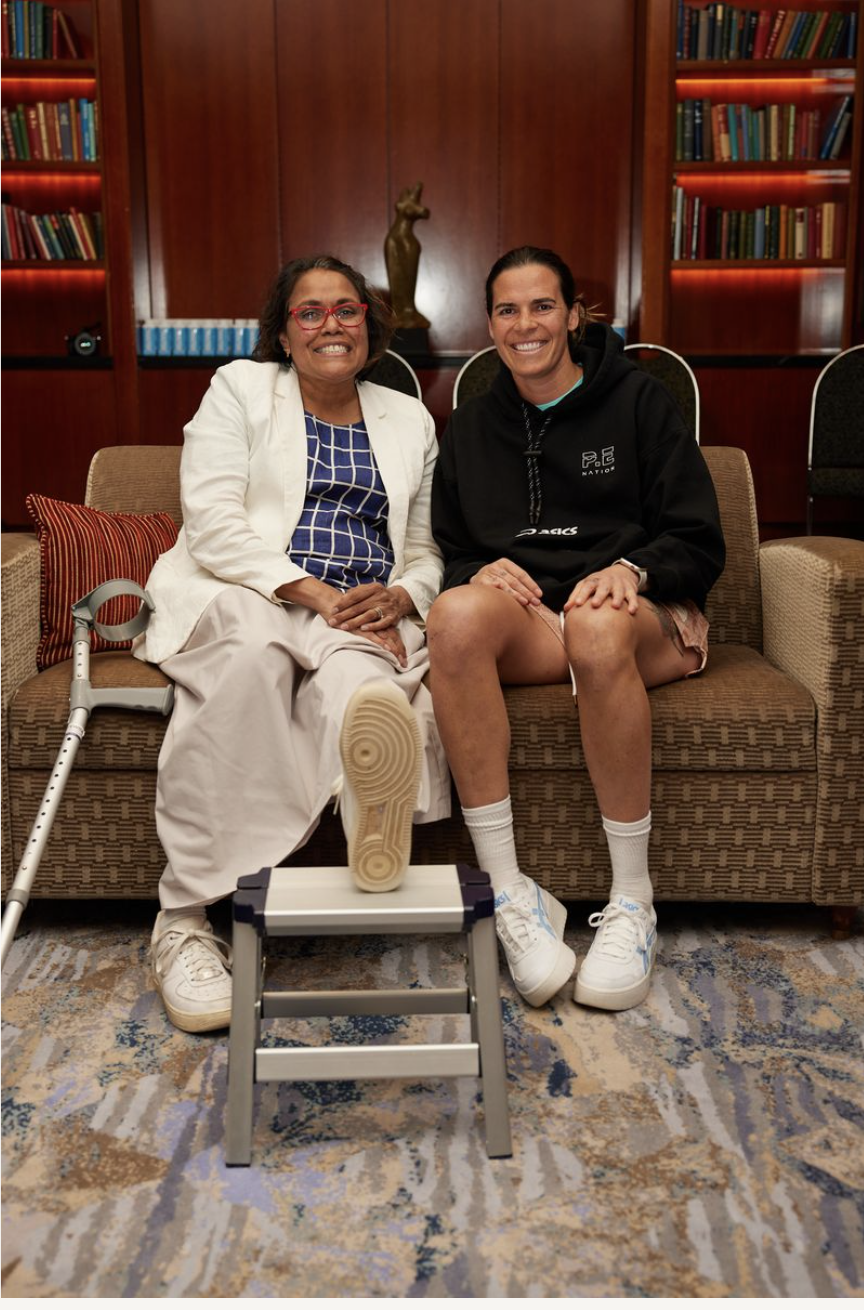CommBank Matildas legends don’t come much bigger than Lydia Williams.
When the goalkeeper debuted in 2005, against South Korea, she was 17 years old. She had not heard of the Matildas before she was called up by then-Head Coach Tom Sermanni. The match was played in front of almost nobody, to very little fanfare, and limited exposure.
In 2023 – 18 years and 104 appearances later – she was a member of the FIFA Women’s World Cup squad that changed football in Australia. Crowds packed into heaving stadiums. Matildas fever abounded. The legacy of that tournament is that the CommBank Matildas, her team, are perhaps the biggest in the country.
Williams had been there through it all over the course of her long career. For every milestone and momentous occasion, the inspirational goalkeeper was front and centre. She had fought for equal pay with her actions both on and off the pitch. She had seen things change slowly – often too slowly.
One of the most moving photos of the tournament came after Australia’s loss to Sweden in the third-place playoff. Williams sat, by herself, leaning against a goal post. She seemed to be reflecting, taking it all in.
“I obviously knew it was going to be my last World Cup. Four years is a long time in between,” Williams reflected, speaking to Football Australia media. “So really it was about taking it all in, it was being appreciative of the opportunity to be a part of the group.

“As we kept progressing, as we kept getting more recognised, as we kept having the nation supporting us, it was just like, it’s something I’ll never forget in my entire life. Hearing the whole crowd singing the national anthem, the first goal that went in against Ireland. Those things you just don’t forget.”
Last month, Lydia Williams announced that she would be retiring from international football after Paris 2024. Her on-field accolades are many. She was part of the AFC Women’s Asian Cup team who lifted the trophy in 2010. She travelled to five FIFA Women’s World Cups and two Olympics and has just been named as a travelling reserve for her third Olympics.
Who can forget her iconic performance against Brazil in 2015? Six saves, including the save of the tournament, kept a clean sheet and ensured the team’s first-ever win in a knock-out game at a FIFA Women’s World Cup.
She was also instrumental in the first – and still only – time that the CommBank Matildas have defeated USA, making several phenomenal saves at the Tournament of Nations in 2017 as the team began to build into their strongest-ever period both on and off the pitch.
“I’ve always wanted to leave the game better than when I came in,” the 35-year-old explained. “That’s been my biggest goal, is to have that opportunity.”
-
Williams was born in the tiny town of Katanning, Western Australia. She was raised in Kalgoorlie before moving to Canberra at the age of 11, where she would take up goalkeeping for the first time.
Her father, Ron, was a Noongar elder. It had a profound impact on the young Lydia when he passed away while she was still a teenager. Football was a space where she was able to find her passion, and it is part of what makes her so motivated to make the game a better space for her teammates.
“Coming off the back of losing a parent, and trying to figure out what’s next, and what’s my passion, and being a little bit lost, I guess, football was there to pick me up, put me back together and develop me into the person who I am today,” she said.
“I’ve always wanted to make sure that was the same experience for everyone, that this could be a safe place. If there was anything that was an issue or things that needed to be changed, 100% I’d hear it and I figure out what’s best – how do we do that, how do we make it better for the people who are coming in?
“I’ve always wanted to leave the game better than when I came in, and it’s nice to know that I’ve done a little bit of that.”
In 2015, after the FIFA Women’s World Cup, the national team went on strike in order to accelerate negotiations for better pay and conditions. Lydia Williams – part of the PFA committee – was the face of the team during this time, relaying the information about their Collective Bargaining Agreement negotiations with the rest of the team.
It was a moment in Matildas history that laid the groundwork for the professionalisation of the national team, and the subsequent strides that have been made regarding pay and conditions since.

“For us it was never about, we need to get equal pay – we never needed to have that – we just wanted to be seen as professional athletes,” Williams said.
She recalled that having access to things like business class flights for international travel and a team chef for the first time meant that they could focus purely on their performance on the pitch.
“It really laid the ground, what we achieved in 2023 was phenomenal,” she added.
Ever humble, she did not mention her significant role in the negotiations. It is not far-fetched to suggest that without Williams’ leadership, the growth that the team has seen in the past decade may not have been so rapid.
Perhaps part of the selflessness that Williams exudes – including growing a reputation of gift-giving and thoughtfulness among her teammates – comes from the challenges of being a part of the goalkeeping union.
Goalkeeper is a unique position. There are long periods of being on the bench, waiting, and biding your time as your teammate – and primary training partner – starts ahead of you. Then there are times where you are the number one, and you are the player who others are waiting for, training with, and asking for guidance from.
“It’s tiring, because you could lose your spot with a bad game,” she explained. “The amount of times I’ve had to fight over the years to go flip flop and be playing, then not playing, okay, now be playing again, be not playing – it gets tiring. It takes a crazy amount of resilience and dedication to be able to do that without getting down on yourself, or losing confidence.
“Only goalkeepers understand that. So, you have to balance the level of competitiveness to the level of nurturing. This person is still your understudy, or this person is still performing. But how do you make sure they get the best out of themselves, and you get the best out of yourself? And how do you continue to do that?
“Obviously, Mac [Mackenzie Arnold] has been around since 2014. She's been there supporting me when I had my highs and lows, and going through that experience together. And now Teagan [Micah], the performance that she had last Olympics. It’s just – you have to be there for each other.”
Williams’ Noongar heritage forms a large part of her identity. As a young Aboriginal girl who loved sport, Cathy Freeman was her hero, particularly after her gold medal-winning 400m race at Sydney 2000.
“I met her at a really young age, back in Kalgoorlie. My Dad was like, ‘you’re going to be like her!’ – but I can’t remember that, I’m pretty sure I was like six or something,” she recalled.
“The one that I do remember was at the Rio Olympics. She came to where we were staying at the athlete’s village, and she was there. And we were getting photos. I’m pretty sure that I could not talk. I was so starstruck, and so in awe… this is the first time I’d been rendered speechless. That was my childhood hero that I could meet in real life.”

“When Cathy could come to camp right before the [FIFA Women’s] World Cup [2023], I think that was a big moment for everybody because everyone remembers that moment when she won gold. And that was probably everyone’s biggest driver into, I’m going to be a professional athlete in whatever way, whatever sport I get thrown into.”
In the same way that Freeman was Williams’ childhood hero, so too is Williams a hero to thousands of players all across the country. Sydney FC’s goalkeeper Jada Whyman, a 24-year-old Wiradjuri and Yorta Yorta woman who has been called up for several international squads since 2018, is one of many who has cited Williams as a role model.
It is these ties that form yet another part of her immense legacy.
“I want to be remembered by the feeling that I’ve given people,” she said.
“Moments come and go, and you kind of remember things here and there, but the one thing that you always remember is a feeling. That’s how I want to be remembered – is that my memory from people and to people is that they’re always left with a good feeling, and look back with fondness.
“They might be 60 and not remember that exact moment, but they know that it was a good moment. I hope that’s what I leave the game.”
